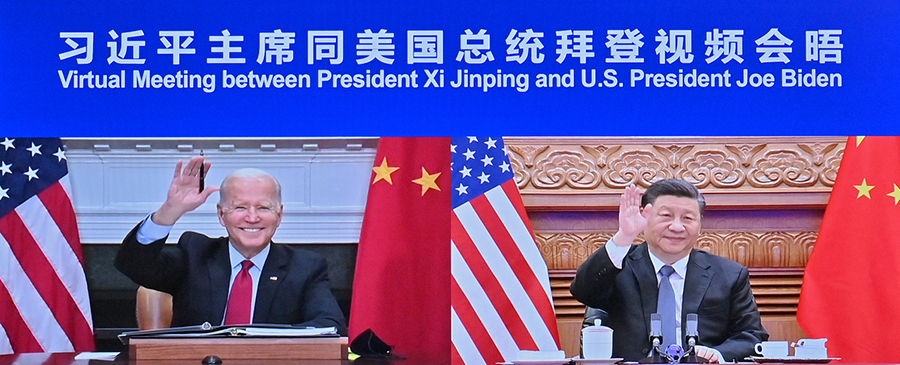
President Xi Jinping meets with US counterpart Joe Biden via video link in Beijing on Tuesday morning, Nov 16, 2021. [Photo/Xinhua]
By Yi Fan
The virtual summit between President Xi Jinping and President Joe Biden on Tuesday could not have come more timely. The world had been concerned whether China-US ties, instead of rebounding from the Trump-era trough, would spiral into a new Cold War when cooperation is urgently needed for the world to emerge from the COVID pandemic, economic recession and climate crisis.
There is no substitute for head-of-state diplomacy in keeping the world's most consequential relationship on track. Xi and Biden have a personal relationship that goes back a decade. When they were seen smiling and waving to each other on screen, many felt a sense of relief.
Direct and candid conversation between Chinese and US presidents has always been an indispensable source of stability and guidance in navigating bilateral ties through rough waters. Though one meeting cannot solve all outstanding issues, many of which are structural, honest conversation can make sure the two leaders "never walk away wondering what the other man is thinking".
The fact that the meeting lasted nearly four hours is a clear sign that both presidents are prepared to invest time and effort and continue their tradition of substantive and constructive discussions, which means a great deal to not just the countries they lead, but also a world that counts on China and the US being able to talk to each other and work through challenges together.
Both leaders indicated a strong desire, before and during the meeting, to manage stiff competition and identify a way forward for the relationship. Biden emphasized the need for building "commonsense guardrails" and prevent competition from "veering into conflict". Earlier this year, he also promised not to seek "a new Cold War".
While his words may be reassuring, they are yet to be matched by action. What the US says and does regarding Taiwan will be a touchstone. By stepping up official and even military interactions with Taipei, the Biden administration is seen by China as backtracking on longstanding US practice since the Carter administration. The "salami tactic" pursued by separatist forces on the island and their foreign backers risks setting two nuclear powers on a dangerous collision course.
This is compounded by other moves widely perceived as targeting China, such as sending warships to the South China Sea, strengthening the Quad in China's periphery, creating the AUKUS military pact made of three Anglosphere countries, and planning a "summit for democracy" with a selective invitation list. As Joseph Nye recently commented, "The president's actions suggest that his strategy for dealing with China may indeed suffer from Cold War thinking."
During the meeting, Xi offered China's view on what constructive and responsible behavior should look like. China and the US, Xi suggested, must try to get along based on three principles, namely "mutual respect, peaceful coexistence and win-win cooperation", the gist of which was echoed by Biden. This vision recognizes the interdependence of China and the US — contrary to the "splendid isolation" that marked US- and Soviet-led blocs during the Cold War. It also offers a more positive and forward-looking agenda for the two countries whose interests align more than they diverge.
One silver lining to the current tensions in China-US ties is the increasing realization that the relationship is "too big to fail" and the urgency of getting it right. The release of Huawei's CFO Meng Wanzhou after three years, the agreement on reciprocal access for Chinese and US journalists in each other's countries and the recent repatriation of a corrupt Chinese banker who had been hiding in the US for two decades are encouraging signs that practical solutions can be worked out to stabilize the relationship.
Indeed, the imperative of China and the US averting Cold War 2.0 and joining hands to promote global security and prosperity has never been more compelling. China-US cooperation, Xi noted to Biden, "may not solve all problems, but few problems can be solved without it".
The benefits of China-US collaboration are well-documented and appreciated by the world — from their collective effort to stem the global financial meltdown in 2008, to the coordinated response to the Ebola outbreak in Africa in 2014, and to the joint declaration on enhanced climate actions announced recently in Glasgow. Past and ongoing success in cooperation should inspire future efforts to collaborate on issues of shared interest and with far-reaching impact for the world. For starters, the two countries may bring their respective resources to bear and work on vaccinating the world and securing energy supplies.
According to the official readout, Xi proposed a list of areas for cooperation. Biden told reporters afterwards that there is "a lot to follow up on". This is welcome news. While the virtual summit is a good start, now must begin the hard work to turn what has been agreed into something real.
The author is a current affairs commentator based in Beijing.

 中文
中文



